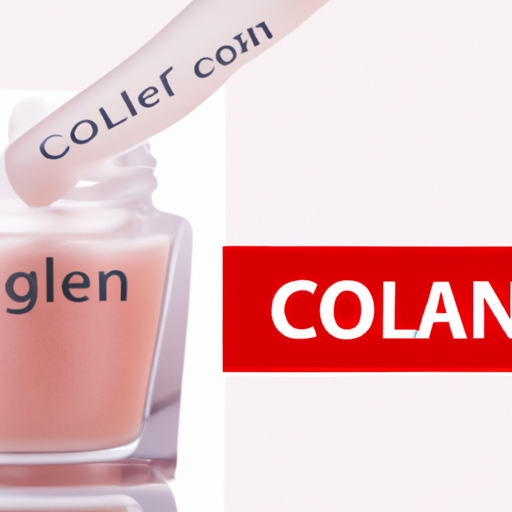Click Here if You Prefer to Listen to Quick Summary Content of the Blog Post about The Collagen Supplements
Understanding the Types of Collagen: A Comprehensive Breakdown
Collagen, the most abundant protein in the human body, plays a vital role in maintaining the structural integrity of various tissues such as skin, bones, and cartilage.
There are several types of collagen, each serving a specific function within the body.
Type I collagen, for instance, is the most abundant type found in the skin, tendons, organs, and bones, providing strength and structure.
Type II collagen is present in cartilage, contributing to its elasticity and ability to absorb shock.
Type III collagen, on the other hand, is commonly found in reticular fibers and skin, supporting the structure of muscles and blood vessels.
When it comes to collagen supplements, it’s essential to understand the differences between collagen peptides and gelatin.
Collagen peptides are hydrolyzed forms of collagen, broken down into smaller particles for easier absorption in the body.
They are often preferred for their higher bioavailability, making them more effective in providing benefits such as improved skin elasticity and joint health.
Gelatin, on the other hand, is derived from collagen through a process of partial hydrolysis and is known for its role in supporting digestive health and joint function.
Collagen supplements into your daily routine can have a range of benefits, particularly in promoting joint health and anti-aging.
Collagen plays a crucial role in maintaining the integrity of cartilage and connective tissues, making it a popular choice for individuals looking to support joint function and reduce inflammation.
Additionally, collagen is essential for skin elasticity and hydration, helping to improve skin texture and reduce the appearance of wrinkles and fine lines.
When choosing a collagen supplement, it’s important to consider the source of the collagen. Marine collagen, derived from fish, is known for its smaller particle size and high absorption rate, making it an excellent choice for improving skin health and nail strength.
Bovine collagen, sourced from cows, is rich in Type I and Type III collagen, making it an ideal option for supporting bone and muscle health.
Understanding the differences between marine and bovine collagen can help you select the right supplement based on your specific health goals.
Demystifying the various types of collagen and their uses can help individuals make informed decisions when incorporating collagen supplements into their daily regimen.
By understanding the unique properties of collagen peptides and gelatin, as well as the benefits of different sources such as marine and bovine collagen, individuals can optimize their joint health, skin vitality, and overall well-being.
Understanding the Types of Collagen: A Comprehensive Breakdown
When it comes to collagen supplements, two popular forms are collagen peptides and gelatin. Both offer unique benefits, but they are not exactly the same.
Collagen peptides are hydrolyzed collagen, broken down into smaller chains of amino acids, making them easier for the body to absorb.
This form is often preferred for its bioavailability and effectiveness in promoting skin elasticity, joint health, and overall anti-aging benefits.
On the other hand, gelatin is derived from collagen by a process of partial hydrolysis. Gelatin is known for its gelling properties and is often used in cooking and making homemade gummies or desserts.
While gelatin still provides some collagen benefits, its effects may not be as potent or quickly absorbed as collagen peptides.
When comparing collagen peptides vs. gelatin, it ultimately comes down to personal preference and intended use. If you are looking for a convenient way to incorporate collagen into your daily routine and reap its full benefits, collagen peptides may be the better choice.
However, if you enjoy making collagen-rich treats or prefer a more budget-friendly option, gelatin can still be a valuable addition to your diet.
Both collagen peptides and gelatin offer unique advantages and can be beneficial for supporting skin health, joint function, and overall well-being.
Whether you choose collagen peptides or gelatin, incorporating collagen-rich foods or supplements into your daily regimen can help you maintain a youthful appearance and support your body’s collagen production over time.
The Role of Collagen Supplements in Joint Health and Anti-Aging
Collagen supplements have gained popularity in recent years due to their potential benefits for joint health and anti-aging.
Collagen is the most abundant protein in the human body and plays a crucial role in maintaining the structure and integrity of our connective tissues, including joints, skin, hair, and nails.
As we age, our bodies produce less collagen, leading to joint stiffness, decreased flexibility, and the formation of wrinkles.
Collagen supplements are believed to help counteract these effects by providing the body with the building blocks needed to support collagen production.
When it comes to joint health, collagen supplements may help reduce joint pain and improve mobility. Studies have shown that collagen peptides can help alleviate symptoms of osteoarthritis and improve joint function.
By replenishing collagen in the body, these supplements may help support cartilage and reduce inflammation in the joints.
In addition to supporting joint health, collagen supplements are also popular for their anti-aging benefits.
Collagen is essential for maintaining the elasticity and hydration of the skin, and its degradation is associated with the formation of wrinkles and sagging skin.
By taking collagen supplements, individuals may promote skin hydration, firmness, and overall skin health.
There are different types of collagen supplements available, with hydrolyzed collagen peptides and gelatin being the most common. Hydrolyzed collagen peptides are broken down into smaller molecules, making them easier for the body to absorb and utilize. Gelatin, on the other hand, is derived from collagen by cooking collagen-rich animal tissues.
When choosing a collagen supplement for joint health and anti-aging, it is essential to consider the source of collagen. Marine collagen, derived from fish, is known for its bioavailability and absorption rate. Bovine collagen, sourced from cows, is another popular option that is rich in Type I and Type III collagen, which are beneficial for skin health.
Collagen supplements play a vital role in supporting joint health and anti-aging by providing essential nutrients for collagen production.
Whether you are looking to improve joint function or enhance your skin’s appearance, incorporating collagen supplements into your daily routine may help you maintain a healthy and youthful body.
Marine Collagen vs. Bovine Collagen: How to Choose the Right One
Collagen supplements have gained popularity in recent years for their potential benefits in promoting skin elasticity, joint health, and overall well-being.
When it comes to choosing the right type of collagen supplement, two common options are marine collagen and bovine collagen.
Each type has its unique characteristics and potential uses depending on individual needs.
Marine Collagen:
Marine collagen is sourced from fish, specifically fish skin or scales. It is known for its smaller particle size, which may lead to easier absorption and higher bioavailability compared to other sources. This type of collagen is rich in Type I collagen, which is beneficial for skin, hair, and nail health. Marine collagen is also believed to have antioxidant properties, helping to combat the effects of free radicals and reduce inflammation in the body.
Bovine Collagen:
Bovine collagen, on the other hand, is derived from cows and is a rich source of Type I and Type III collagen. These types of collagen are essential for supporting connective tissues, such as tendons, ligaments, and muscles. Bovine collagen is often used to promote joint health and may help improve mobility and reduce joint pain. Additionally, bovine collagen is a good source of proline and glycine, amino acids that play a crucial role in collagen production within the body.
How to Choose:
When deciding between marine collagen and bovine collagen, it’s essential to consider your specific health goals. If you are looking to improve skin elasticity, nail strength, and hair health, marine collagen may be the better choice due to its Type I collagen content and potential antioxidant properties.
On the other hand, if you are targeting joint health and connective tissue support, bovine collagen with its combination of Type I and Type III collagen may be more beneficial.
Ultimately, the choice between marine collagen and bovine collagen depends on your individual needs and desired health outcomes.
Both types of collagen offer unique benefits, so it’s essential to assess your goals and consult with a healthcare provider or nutritionist before incorporating any supplement into your routine.
By understanding the differences between marine and bovine collagen, you can make an informed decision to support your overall health and well-being.
Understanding Collagen Supplements for Skin Health
Collagen supplements have gained popularity in recent years due to their potential benefits for skin health. As we age, our skin loses its elasticity and firmness, leading to wrinkles and sagging.
Collagen, a protein that provides structural support to the skin, plays a crucial role in maintaining its youthfulness and vibrancy.

Types of Collagen Supplements for Skin
There are various types of collagen used in supplements, each with its unique properties and benefits for the skin. The most common types include:
- Type I Collagen: This type of collagen is abundant in the skin and helps maintain its strength and structure. Type I collagen supplements can improve skin hydration, elasticity, and firmness, reducing the appearance of fine lines and wrinkles.
- Type II Collagen: Found primarily in cartilage, type II collagen supplements can benefit the skin by supporting overall joint health and mobility. It may also have anti-inflammatory effects, which can help reduce skin redness and irritation.
- Type III Collagen: This type of collagen is often found alongside type I collagen and contributes to skin elasticity and firmness. Type III collagen supplements can promote skin regeneration and repair, resulting in smoother and more youthful-looking skin.
Benefits of Collagen Supplements for Skin
Collagen supplements offer several benefits for skin health, including:
- Improved hydration: Collagen helps retain moisture in the skin, keeping it hydrated and plump.
- Enhanced elasticity: By supporting the skin’s structure, collagen can improve its elasticity and firmness.
- Reduced wrinkles: Supplementation with collagen can help reduce the appearance of fine lines and wrinkles, promoting smoother skin texture.
- Skin repair: Collagen aids in skin regeneration and repair processes, speeding up the healing of wounds and blemishes.
- UV protection: Some studies suggest that collagen supplements may help protect the skin from UV-induced damage, such as sunburn and premature aging.
Best Practices for Using Collagen Supplements
To maximize the benefits of collagen supplements for skin health, consider the following best practices:
- Choose high-quality supplements from reputable brands to ensure safety and efficacy.
- Follow the recommended dosage instructions provided on the product label or by a healthcare professional.
- Be consistent with your supplementation routine to allow time for the collagen to be absorbed and incorporated into the skin.
- Combine collagen supplements with a healthy diet rich in vitamins, minerals, and antioxidants to support overall skin health.
- Practice a skincare routine that includes cleansing, moisturizing, and sun protection to complement the effects of collagen supplementation.
Collagen supplements into your daily regimen can be a beneficial addition to your skincare routine, promoting youthful, radiant skin from within.
By understanding the different types of collagen and their specific benefits for skin health, you can make an informed choice to support your skin’s beauty and vitality.

Conclusion
In , demystifying the world of supplements and understanding the different types of collagen and their uses can significantly impact our overall health and well-being.
From the comprehensive breakdown of collagen types to the debate between collagen peptides and gelatin, each aspect plays a vital role in helping consumers make informed choices.
The discussion on collagen’s role in joint health and anti-aging sheds light on its importance in maintaining mobility and youthful skin.
Whether one opts for marine collagen or bovine collagen depends on personal preferences and dietary restrictions, but both types offer unique benefits that cater to individual needs.
When it comes to skincare, collagen supplements have gained popularity for their ability to promote skin elasticity and hydration, reducing the signs of aging.
By incorporating collagen-rich foods and supplements into our daily routine, we can work towards achieving glowing and youthful skin from within.
Choosing the right type of collagen and understanding its uses allow us to harness the full potential of these supplements for our health and beauty.
It’s essential to consult with healthcare providers or skincare professionals before incorporating collagen into our daily regimen to ensure optimal results.
In essence, as we navigate the vast array of collagen supplements available in the market, being aware of the different types of collagen and their specific benefits empowers us to make informed decisions that align with our health goals.
By embracing collagen as a valuable supplement in our wellness journey, we can unlock its transformative effects on our joint health, skin vibrancy, and overall vitality.
Let’s demystify supplements and embrace the power of collagen for a healthier and more radiant future.

